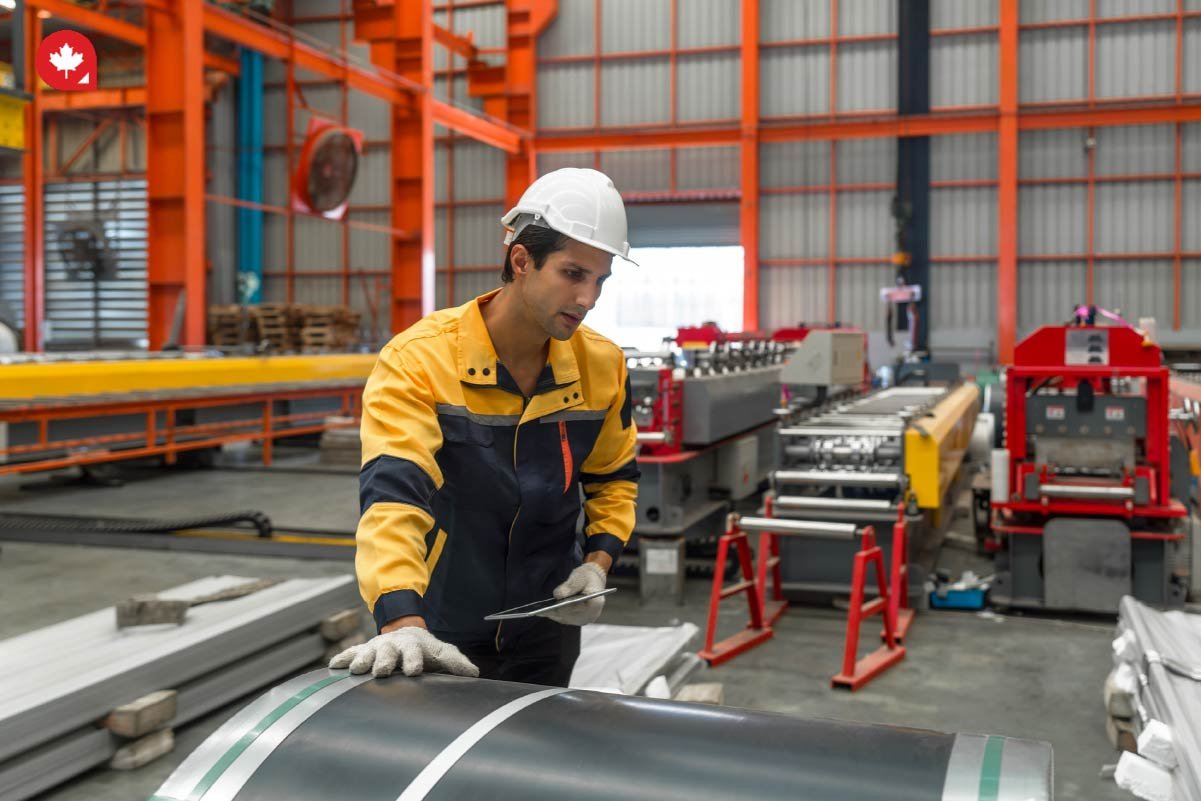The Canadian metal industry is dynamic, offering many career opportunities from fabrication to engineering. Finding the right job can be exciting and challenging as Canada's metals industry grows. Leveraging effective job search strategies is crucial to navigating this competitive labor market. The metal industry's output is essential to Canada's economy, from automotive components to heavy machinery.
Let’s walk you through the key strategies for securing a job in Canada's metal industry, from understanding essential qualifications to taking advantage of networking opportunities.
Canada's Metal Industry

Canada boasts a robust metal industry, contributing significantly to its manufacturing sector. With a focus on innovation and sustainability, the industry offers diverse career paths for skilled workers. The industry's output is diverse and essential to Canada's economy, from automotive components to heavy machinery. Canada’s metal industry includes many industrial processes, such as mining, extraction, fabrication, and finishing. As technology advances, automation, robotics, and metallurgy positions are also gaining prominence.
Among key economic sectors drivers of the Canadian metal industry include:- Automotive manufacturing,
- Aerospace,
- Construction, and
- Oil and gas extraction and processing.
These sectors fuel the demand for a skilled workforce across various roles.
Top 10 Most In-demand Jobs in Canada’s Metal Industry
Consulting recent industry reports and job boards is essential to determine the most in-demand jobs accurately. Here is a table of the top 10 most in-demand jobs in Canada’s metal industry, with National Occupational Classification (NOC) codes and annual average salaries from Canada’s Job Bank.
| In-demand Canadian Metal Industry Jobs | NOC Codes | Canada’s Job Bank |
|---|---|---|
| Mechanical Engineers | 21301 | 116,569.51 |
| Industrial Electricians | 72201 | 103,719.49 |
| Sheet Metal Workers | 72102 | 94,291.13 |
| Tool and Die Makers | 72101 | 80,822.14 |
| Machinists | 72100 | 77,717.77 |
| Welders | 72106 | 75,429.08 |
| Structural Steel Fitters | 72104 | 72,738.61 |
| Metal Fabricators | 72104 | 66,868.78 |
| Metal Finishers | 95101 | 57,922.95 |
| Metalcasting Technicians | 94101 | 42,451.5 |
How Can I Find a Job in Canada’s Metal Industry?

Canada's metal industry is a cornerstone of its manufacturing sector, offering diverse opportunities for skilled workers. Whether you're a seasoned professional or a recent graduate, here is a guide to help you find a job in Canada’s metal industry.
Step 1: Identify Your Specific Role
The metal industry includes a wide range of roles. Determine your skill set and interests to pinpoint your ideal position. Consider factors such as your education, experience, and the specific area of metalworking you're passionate about. Common roles include welder, fabricator, machinist, metallurgist, quality control inspector, and industrial mechanic.
Step 2: Highlight Your Relevant Skills and Qualifications
Identify the skills and qualifications necessary for your desired role. Technical proficiency, such as welding certifications or machining expertise, is crucial. Soft skills, including problem-solving, communication, and teamwork, are also essential. Highlight any relevant experience, whether through formal education, apprenticeships, or previous employment.
Learn how to improve your job skills in Canada.
Step 3: Craft Your Resume and Cover Letter to Canadian Standards
Crafting a compelling resume and cover letter is essential. Use these documents for specific job openings, emphasizing how your skills align with Canadian employers' requirements. Use keywords from the job description to increase your chances of passing through applicant tracking systems. Highlight your achievements and quantify your accomplishments whenever possible.
Step 4: Network Within the Industry
Building a solid professional network is crucial in the metal industry. Attend industry conferences, trade shows, and events to connect with professionals. Join industry associations and participate in online forums to expand your network. Use platforms like LinkedIn to connect with potential Canadian employers and industry peers.
Learn about Canada’s professional immigrant networks.
Step 5: Explore Job Boards and Company Websites
Use online job boards like Indeed, LinkedIn, Monster Canada, Glassdoor, and Canada’s Job Bank to search for metal industry positions. Many companies in this sector have their career sections on their websites. Regularly check these platforms for new job postings.
Step 6: Consider Temporary or Contract Work
Temporary or contract positions can be a great way to gain experience in the metal industry and build your network. These opportunities can also lead to permanent employment. Consider working with staffing agencies that specialize in industrial and manufacturing roles.
Step 7: Use Recruitment Agencies
Recruitment agencies can help you find suitable job opportunities in the metal industry. They often have connections with employers and can provide career guidance. Research agencies specializing in industrial and manufacturing placements. Here are some notable recruitment agencies specializing in Canada’s metal industry.
Step 8: Stay Updated on Industry Trends
The metal industry is constantly evolving. Stay informed about new technologies, materials, and industry trends. Attend industry workshops and webinars to enhance your knowledge and skills. This demonstrates your commitment to professional development and makes you a valuable asset to potential Canadian employers.
Step 9: Consider the Location
Canada has several regions with thriving metal industries. Research different locations to determine where job opportunities align with your career goals and personal preferences. Factors such as cost of living, job market conditions, and company size should be considered when deciding. Canadian provinces or territories with the most in-demand metal industry jobs are:
- Ontario: Leader in Canada's metal industry, boasting the highest concentration of jobs and a diverse range of manufacturing sectors.
- Quebec and Alberta: Significant metal industry presence, particularly in automotive and energy-related manufacturing.
- British Columbia and Manitoba: Growing metalworking sectors, focusing on shipbuilding and agriculture-related equipment.
How Can I Work in Canada’s Metal Industry?

Canada's metal industry offers promising opportunities for skilled workers. You must get a Canada work permit after securing a job in Canada’s metal industry.
Canada Work Permit
A Canadian work permit is a legal document issued by Immigration, Refugees, and Citizenship Canada (IRCC) that allows a foreign worker to work in Canada for a specific employer or occupation. The common types of Canadian work permit you can apply for include:
- Employer-Specific Work Permit: Allows you to work for a specific Canadian employer at a specific location and time in Canada, usually through the Temporary Foreign Worker Program (TFWP).
- Open work permit: Allows you to work for any employer in Canada. Typically issued to spouses of work permit holders or international students.
- Work Permits for Specific Programs: Some programs, like the International Mobility Program (IMP), offer work permit options for specific occupations.
Obtaining a Canadian work permit can be challenging. General steps include:
Learn how to make sure your Canadian work permit application is complete.
FAQs
Are There Opportunities For Advancement in Canada’s Metal Industry?
Yes, Canada's metal industry offers strong opportunities for advancement. With skill development, experience, and a focus on industry trends, individuals can progress to supervisory, managerial, or executive roles.
What Are the Best Cities in Canada to Find a Job in the Metal Industry?
Major industrial centers like Toronto, Montreal, and Vancouver offer a high concentration of metal industry jobs. However, smaller cities with manufacturing hubs, such as Hamilton, Winnipeg, and Edmonton, also have significant opportunities.
What Kind of Interview Questions Can I Expect for a Canadian Metal Industry Job?
Expect questions about your technical skills, safety knowledge, problem-solving abilities, and experience in the metal industry. You might also face questions about teamwork, communication, and your ability to work in a fast-paced environment.




